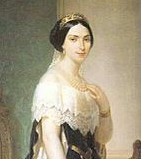
Vincenzo Salvatore Carmelo Francesco Bellini was an Italian opera composer, who was known for his long-flowing melodic lines for which he was named "the Swan of Catania". Many years later, in 1898, Giuseppe Verdi "praised the broad curves of Bellini's melody: 'there are extremely long melodies as no-one else had ever made before'."

Domenico Gaetano Maria Donizetti was an Italian composer, best known for his almost 70 operas. Along with Gioachino Rossini and Vincenzo Bellini, he was a leading composer of the bel canto opera style during the first half of the nineteenth century and a probable influence on other composers such as Giuseppe Verdi. Donizetti was born in Bergamo in Lombardy. At an early age he was taken up by Simon Mayr who enrolled him with a full scholarship in a school which he had set up. There he received detailed musical training. Mayr was instrumental in obtaining a place for Donizetti at the Bologna Academy, where, at the age of 19, he wrote his first one-act opera, the comedy Il Pigmalione, which may never have been performed during his lifetime.

I puritani is an 1835 opera by Vincenzo Bellini. It was originally written in two acts and later changed to three acts on the advice of Gioachino Rossini, with whom the young composer had become friends. The music was set to a libretto by Count Carlo Pepoli, an Italian émigré poet whom Bellini had met at a salon run by the exile Princess Belgiojoso, which became a meeting place for many Italian revolutionaries. The opera is based on Têtes Rondes et Cavaliers, a historical play written by Jacques-François Ancelot and Joseph Xavier Saintine and set in the English Civil War, which some sources state was based on Walter Scott's 1816 novel Old Mortality, while others state that there is no connection.
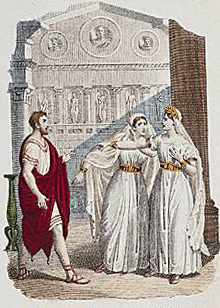
Norma is a tragedia lirica or opera in two acts by Vincenzo Bellini with libretto by Felice Romani after the play Norma, ou L'infanticide by Alexandre Soumet. It was first produced at La Scala in Milan on 26 December 1831.

La sonnambula is an opera semiseria in two acts, with music in the bel canto tradition by Vincenzo Bellini set to an Italian libretto by Felice Romani, based on a scenario for a ballet-pantomime written by Eugène Scribe and choreographed by Jean-Pierre Aumer called La somnambule, ou L'arrivée d'un nouveau seigneur. The ballet had premiered in Paris in September 1827 at the height of a fashion for stage works incorporating somnambulism.

Giuseppe Felice Romani was an Italian poet and scholar of literature and mythology who wrote many librettos for the opera composers Donizetti and Bellini. Romani was considered the finest Italian librettist between Metastasio and Boito.
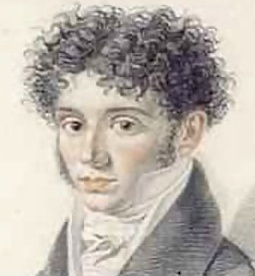
Adelson e Salvini is a three-act opera semiseria composed by Vincenzo Bellini from a libretto by Andrea Leone Tottola. The opera was based on the 1772 novel Épreuves du Sentiment by François-Thomas-Marie de Baculard d'Arnaud, and it draws on a previously performed French play of 1803 by Prospère Delamare.

I Capuleti e i Montecchi is an Italian opera in two acts by Vincenzo Bellini. The libretto by Felice Romani was a reworking of the story of Romeo and Juliet for an opera by Nicola Vaccai called Giulietta e Romeo and based on the play of the same name by Luigi Scevola written in 1818, thus an Italian source rather than taken directly from William Shakespeare.

Il pirata is an opera in two acts by Vincenzo Bellini with an Italian libretto by Felice Romani which was based on a three-act mélodrame from 1826: Bertram, ou le Pirate by Charles Nodier and Isidore Justin Séverin Taylor). This play was itself based upon a French translation of the five-act verse tragedy Bertram, or The Castle of St. Aldobrand by Charles Maturin which appeared in London in 1816.
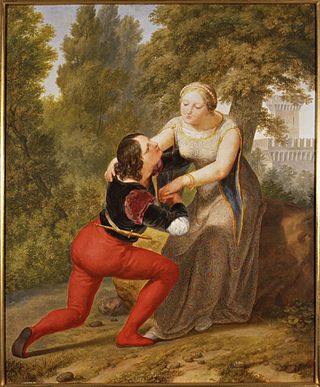
Beatrice di Tenda is a tragic opera in two acts by Vincenzo Bellini, from a libretto by Felice Romani, after the play of the same name by Carlo Tedaldi Fores.

La straniera is an opera in two acts with music by Vincenzo Bellini to an Italian libretto by Felice Romani, based on the novel L'Étrangère by Charles-Victor Prévot, vicomte d'Arlincourt, although writer Herbert Weinstock also adds that it is "more likely [based on] a dramatization of [that novel] in Italian by Giovan Carlo, barone di Cosenza" since he then quotes a letter from Bellini to his friend Francesco Florimo in which he says that Romani "certainly will not follow the play" [suggesting then that they were aware of its existence.]
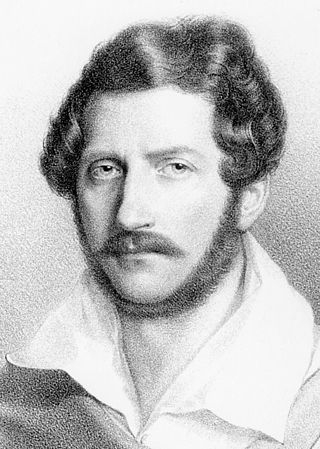
Gianni di Parigi is an 1839 melodramma comico in two acts with music by Gaetano Donizetti to a libretto by Felice Romani, which had previously been set by Francesco Morlacchi in 1818 and by Giovanni Antonio Speranza in 1836.

Zaira is a tragedia lirica, or tragic opera in two acts by Vincenzo Bellini set to a libretto by Felice Romani which was based on Voltaire's 1732 play, Zaïre. The story takes place in the time of the Crusades and the opera's plot involves the heroine, Zaira, struggling between her Christian faith and her love for Orosmane, the Muslim Sultan of Jerusalem.

Aureliano in Palmira is an operatic dramma serio in two acts written by Gioachino Rossini to an Italian libretto in which the librettist was credited only by the initials "G. F. R." The libretto has generally been attributed to Felice Romani, but sometimes to the otherwise unknown Gian Francesco Romanelli. It has been suggested that the latter name may have resulted from a confusion of Romani with Luigi Romanelli, La Scala's house poet prior to Romani's appointment to the post.
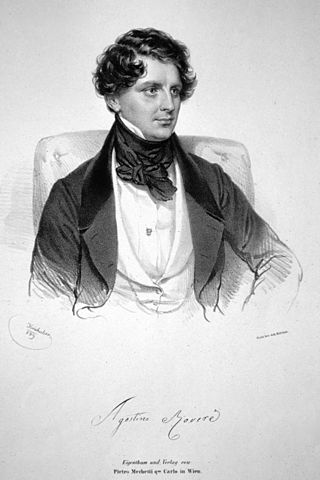
Agostino Rovere was an Italian operatic bass.

Il borgomastro di Saardam is an 1827 melodramma giocoso in two acts by Gaetano Donizetti. The libretto, by Domenico Gilardoni, was based on the 1818 play Le bourgmestre de Sardam, ou Les deux Pierres by Mélesville, Jean-Toussaint Merle and Eugène Cantiran de Boirie. Albert Lortzing's 1837 opera Zar und Zimmermann is ultimately based, via a German translation, on the same French play. The plot concerns a famous episode in the life of Peter the Great, in which he disguised himself under an assumed name as a worker in the shipyards of Saardam, and has certain similarities to Donizetti's earlier 1-act farce Il falegname di Livonia.
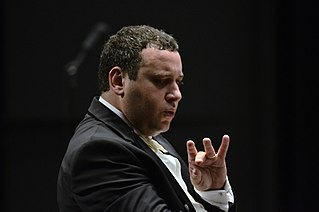
Antonino Fogliani is an Italian conductor.
Domenico Gilardoni (1798–1831) was an Italian opera librettist, most well known for his collaborations with the composers Vincenzo Bellini and Gaetano Donizetti.

Vincenzo Negrini was an Italian bass-baritone opera singer. Born in Cesena, he sang leading bass and baritone roles in Italy's major opera houses and created several roles in early 19th-century operas, most notably Oroveso in Bellini's Norma and Folco in Donizetti's Ugo, conte di Parigi. Severe heart disease caused him to retire from the stage in June 1840. He died in Milan two months later at the age of 35.
Pio Botticelli was an Italian bass-baritone active in the opera houses of Italy from 1810 until the mid-1840s. Amongst the numerous roles he created in world premieres were Pietro il Grande in Donizetti's Il falegname di Livonia and The Caliph in Pacini's La schiava in Bagdad. He also sang the role of Leucippo in the Austrian premiere of Rossini's Zelmira.

